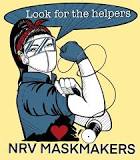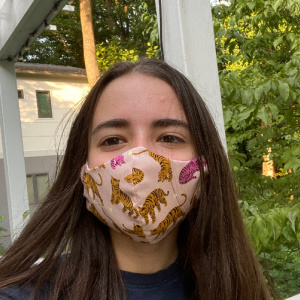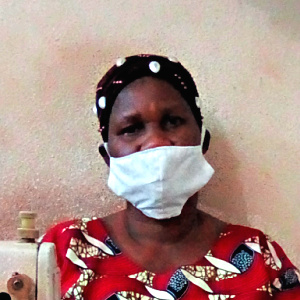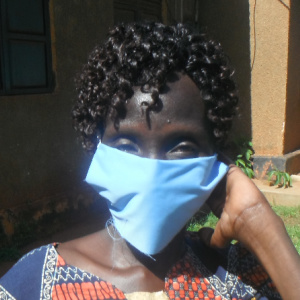Washington, DC, July 17: President Trump’s mockery of face-masks will go down as one of his more spectacular missteps. It’s not just that masks save lives. It’s that the act of making these unassuming attachments has lifted the spirits of women around the world and given them a sense of purpose during a period of anxiety and isolation.
The Advocacy Project has witnessed this at first hand while supporting several small mask-making projects in the Global South and working with quilters in the US who have assembled advocacy quilts with us through the years. Many of our quilting friends have now turned to making masks. It has clearly been quite a ride.

The New River Valley Mask Makers have produced over 12,000 masks for under-served communities in Virginia.
We know quilters to be formidably focused, but several say that they were initially paralyzed by the speed of the COVID-19 lock-down. “I was frozen and could not sew or create,” recalls Paula Golden, who has been named Teacher of the Year by the Professional Quilter Magazine.
Paula quickly recovered and joined the New River Valley Mask Makers in southwest Virginia, a rapidly-growing group of over 600 mask-makers that has made over 12,000 masks, including 2,000 surgical masks for EMTs and clinics in rural areas. “Making masks gives me a purpose and a structure to my day,” writes Paula. “Once my mask-making quota for the week is met I can garden and quilt with a clear conscience.”
Hope Barton, who recently contributed an art quilt for the Sister Artists auction, also remembers the initial feeling of drift when the crisis struck. “I couldn’t seem to focus. I just wandered the house, didn’t seem to know what to do with myself. And then I got requests from my family to make masks. Suddenly I could DO something that would actually help. Maybe I couldn’t hold my newborn grandson in Denver, but I could protect his parents by mailing them masks.”
Bobbi Fitzsimmons, an AP Board member who has taught quilting in Nepal and Kenya, was still recovering from the loss of her husband when the pandemic struck in March, deepening her sense of isolation. So Bobbi turned to her trusted sewing machine and began making masks for the nursing home which had cared for her husband. It has helped her to deal with the loneliness: “Sometimes it is so quiet that I don’t remember to turn on the radio. Back there in the sewing room, the machine is humming, I watch my masks stack up.” (Check out Bobbi’s AP blog about making masks).
Quilter Alycia Chu in San Francisco has made over 400 masks with a Pickleball design to encourage senior citizens to play the game and exercise. Over 500 Pickleball players have signed up for Alycia’s email and she is now receiving commissions. She hopes that her masks will becomes a symbol of “unity and love for the game.”
Masks have also energized the youngest member of our AP team, Grace McGuire, 17, a senior at the Walt Whitman School in Bethesda. PBS interviewed Grace making masks in April and she has since gone on a creative romp – making over 300 masks and raising $200 for the inspiring mask-maker Mama Cave in Uganda. Grace is now making masks to promote Tiger bags made by wives of the disappeared in Nepal. “I like to know I’m helping,” she says simply.
All of these mask-makers will confirm that stitching and sewing can be profoundly therapeutic. This will come as no surprise to the aid workers who organized knitting for traumatized women and girls in Bosnia 25 years ago this month, following the massacre of their menfolk at Srebrenica.
Nor will it seem strange to quilters who love the sense of companionship that comes from quilting in a group. The pandemic may make it impossible for mask-makers to meet in person, but Bobbi enjoys the weekly Zoom meetings with others from her group in North Carolina known as Mission Possible: Mask Wearing is Caring.
And this is just in the United States. Mask-makers are now a global movement. Bobbi’s group is a member of the Open Source Medical Supplies, a network of 73,500 members in 55 counties who have produced an astounding 14.5 million masks.
In Zimbabwe, Constance Mugari has made hundreds of masks and delivered them along with food and soap to vulnerable families in Harare. In Mali, Abi Konate has made masks for local medical centers. In Uganda, Mama Cave and her team have produced 600 masks for persons with disability and in so doing laid the foundation for a small business. In western Nepal, Sarita Thapa donated her 200 masks to clinics.
All of which leads to a deeply paradoxical conclusion: for all the evil it has wrought, the COVID-19 pandemic is creating social capital, empowering women, building networks, and showing yet again the formidable power of women’s civil society.
History will honor these mask-makers for acting decisively while governments dithered. Yet while most politicians have now come to their senses, it still angers Bobbi that so many lives have been lost and the virus is again coursing through America’s veins.
Other mask-makers are dreading the prospect of a second wave in the Fall. Hope Barton is preparing to make masks for children when schools re-open. Bobbi is wondering how masks can even be worn by children in a school environment that is already a “petri dish for germs.” Some mask-makers are simply burned out.
But none of this will slow the tide. Writes Paula Golden: “I make masks because I care. If we do not take care of each other for the greater good, who are we as a human race?”
“All of which leads to a deeply paradoxical conclusion: for all the evil it has wrought, the COVID-19 pandemic is creating social capital, empowering women, building networks, and showing yet again the formidable power of women’s civil society.”
Posted By Iain Guest
Posted Jul 17th, 2020






3 Comments
Sarah Craven
July 20, 2020
What an inspiring piece! Thank you for sharing the story of these creative caring women who are making a difference in their communities and around the globe. It’s refreshing to read some good news.
Iain Guest
July 21, 2020
Thanks Sarah! It’s terribly important to understand how this crisis is galvanizing women and women’s advocacy! Masks are just one of the many vehicles, bless them!
Alexandra Mayer
August 4, 2020
Iain, I absolutely LOVE this post. You are able to find and expand upon a glimmer of hope in this awful situation. This piece represents what drew me to AP in the first place: the organization amplifies the voices and actions of individuals who are empowering themselves and protecting their communities in the face of extreme hardship.